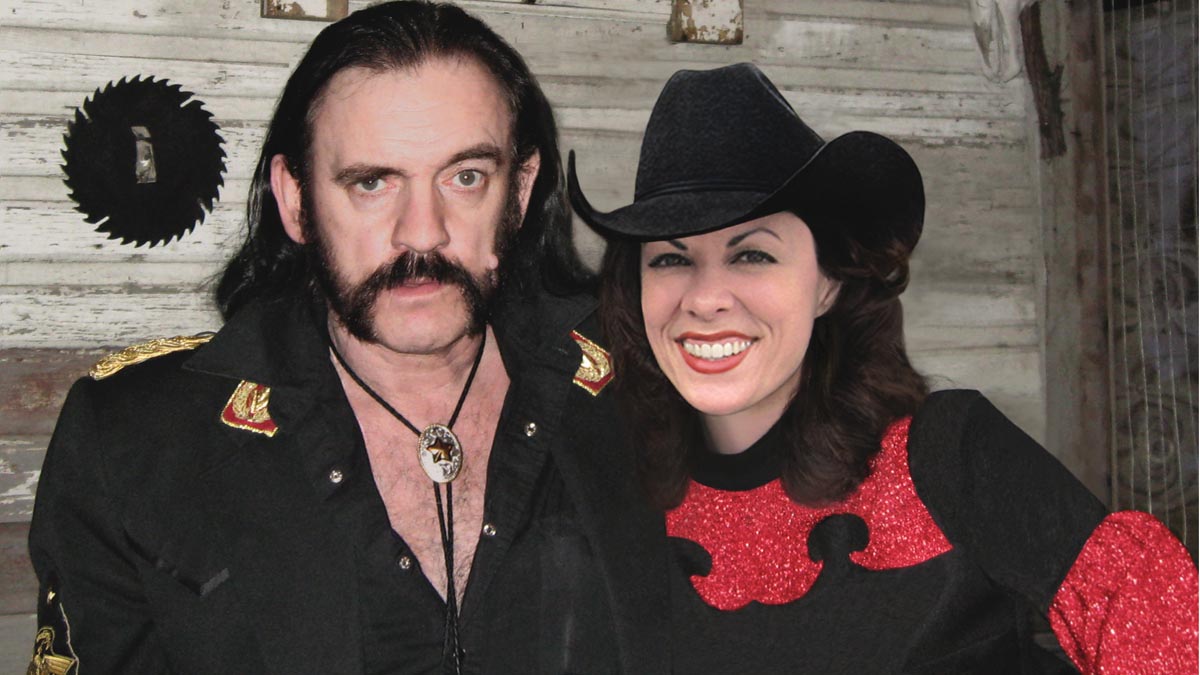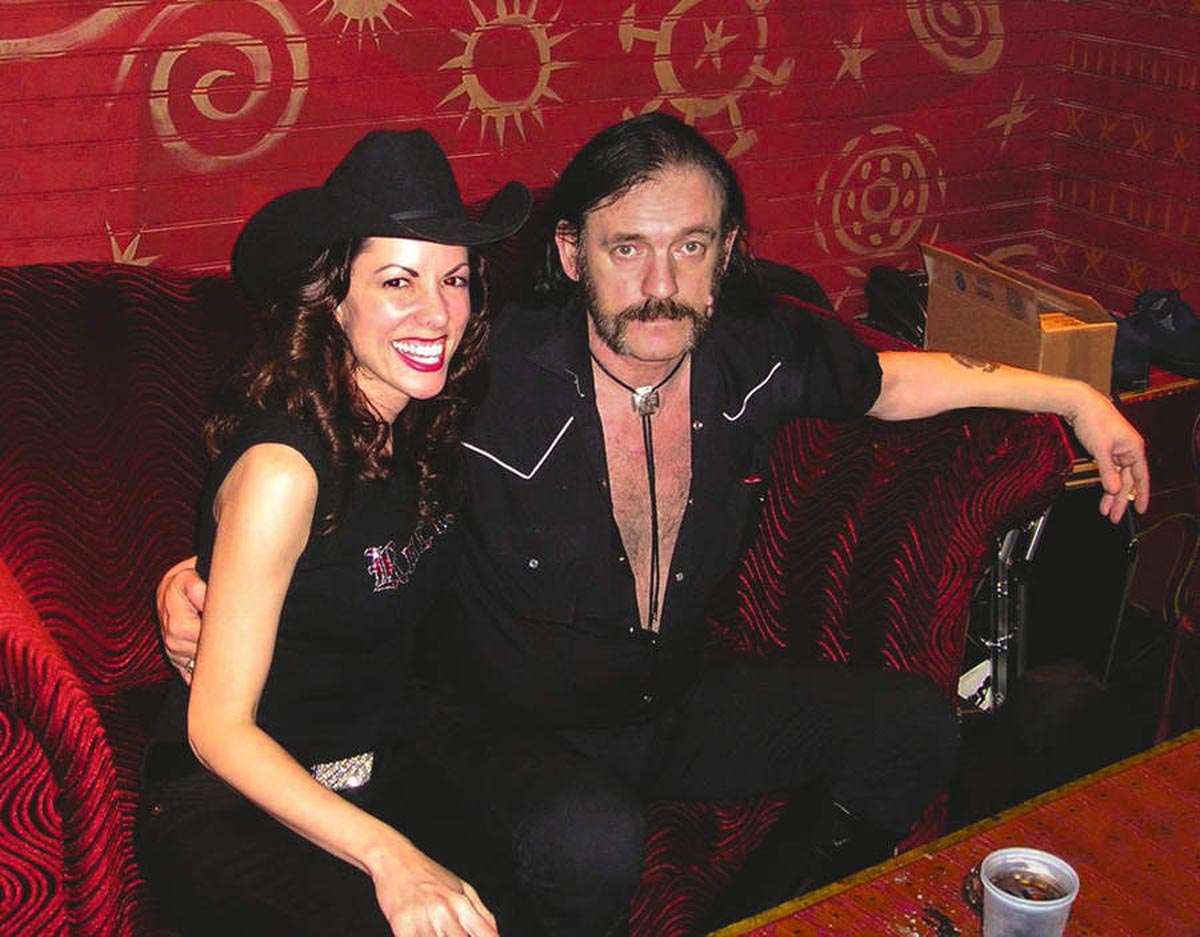Lynda Kay remembers Lemmy Kilmister, the rock 'n' roll icon with a heart of gold
The actor and musician Lynda Kay on a friendship less ordinary and a special duet with the late Motörhead frontman

The acclaimed singer, guitarist and actor Lynda Kay was born in Dallas, Texas and resides in Los Angeles, appropriately so as she has been a regular on the music scene and on TV shows such as Amazon Prime’s Goliath for many years.
Along the way, she struck up a close friendship with the late Motörhead singer Lemmy, a hero in our world – not just for his unique bass guitar playing, but also for the sheer force of his intellect and personality.
Kay’s new album, Black And Gold, features a beautifully heartfelt duet with the man himself called The Mask – required listening for anyone interested in his more introspective side. Here, Kay recalls her many memories of life with the last true rock star.
Lemmy could have been a pirate or a cowboy in a different era in history – but he would always have been a force of a man
How did you first meet Lemmy, Lynda?
"My husband Jonny and I own Coffin Case, the guitar case company, and Jonny knew Lemmy because Motörhead was sponsored by Coffin and he had a great relationship with him and his management. I met Lemmy through Coffin, and I was in a roots duo called the Lonesome Spurs with Danny B. Harvey, the guitarist who played with him in Headcat.
"I knew Slim Jim Phantom too, the drummer. I’d be at a lot of the Headcat shows and I was the little Angie Dickinson to their Rat Pack, I guess. In 2006, Lemmy came to one of our shows and was very impressed. I was playing guitar, singing and playing a suitcase kick drum, and he told me ‘You keep good time!’
Lemmy was 61 in 2006. Was he in good shape?
Get The Pick Newsletter
All the latest guitar news, interviews, lessons, reviews, deals and more, direct to your inbox!
"He was in great shape. He looked great, he felt great, and he was still living the rock’n’roll life – he was prime Lemmy! From there we ended up hitting it off, and we developed a friendship, and he invited me over to his place to hang out. I was like ‘Sure!’, and went over to the classic apartment that he had in West Hollywood.
"I’m sure you’ve heard about that apartment – it was pretty wild. It featured heavily in the Lemmy documentary that was being made at the time, and I got to know the directors."
What was the lair of Lemmy like?
"The first time I was there, it was scary as hell to see all the things that he had in the apartment. He had so many knives – hundreds, of all different sizes. They were lined up on the walls, diagonally. It was really intense, and it freaked me out so much because they were all over the walls, everywhere.
"He also kept every piece of fan art that anyone ever made for him – every single piece. He had them in glass cases all around his apartment, to honor the work of these people. It was really something.
The first time I came over I had a Ramones T-shirt on and he said ‘That’s a good band. This one’s better. Here’ and he pulled out a Motörhead shirt and gave it to me. It had silver foil lettering and he said ‘This here is the executive model!’
Did you ask him why he collected knives?
"One time I asked him ‘What’s up with all the knives, man?’ and he was like ‘Oh, okay’, and told me that they were a collection from Nazi Germany. He had swords and all kinds of other stuff too.
Lemmy kept every piece of fan art that anyone ever made for him – every single piece. He had them in glass cases all around his apartment, to honor the work of these people
"He went over to the corner of the living room, where there was a big bucket containing several swords, and said ‘Look, I wanna show you some of these’. He picked up this sword and wielded it while standing over me. He looked like a wild man as he was describing it.
"He said ‘Look, this one’s got a blade up on top and this has one on the bottom, so that you can stick it in somebody and then pull it out’, and I was like, ‘Okay, that’s enough’. He said, ‘Am I scaring you?’ I laughed and said ‘No, but I gotta know – why do you collect all these things? Why?’
"He set the sword down and very sombrely said, ‘So that nobody else can be hurt by these weapons any more’. He collected them to keep them out of the hands of people who would use them to do harm."

Is it true that he was a highly literate man?
"Yes. He had an insane collection of books, because he was an avid reader—really into history. He was very worried that history would repeat itself and that we would have to learn the same lessons all over again. He would read to me from poetry books, mostly by old English poets.
"He would read prose too. I remember looking at him while he was reading to me, and it occurred to me that he could have been a pirate or a cowboy in a different era in history – but he would always have been a force of a man.
"He had this huge book on astrology, which fascinated him. He would say ‘Look! This shows the birthdays of different people in history’ and then look at me with those crazy eyes. He said ‘I share a birthday with Nostradamus!’ He loved that, and I loved that he loved it. He was such a renaissance man."
What else was he into?
"He also loved the TV series Law And Order, which I loved too because I went to law school. He thought that was so badass and said ‘But you didn’t practise law, huh?’ and I said no, because I hated lawyers, ha ha! He loved rock documentaries too: Behind The Music was big at the time.
"What was hilarious was if there was anything wrong, that he could correct from his own experience, he would be like ‘Fuck that!’ and he would pause it and tell me the real story. ‘You wanna know what really happened?’ It was hysterical."
How would you describe his politics?
"He was a very liberal, ‘live and let live’ person. He told me ‘I don’t give a shit if people are gay. Who cares?’ He was just a really genuine, good-hearted man who had a heart of gold. He had a really special warm spot for women, especially when it came to giving women a platform in rock ’n’ roll.
"He thought that women had it tough in rock music, and he said ‘They’re better than men. They look cooler when they’re doing it, too’. He was very supportive. ‘Women find it harder to rise above the noise and the bullshit’ was how he put it. He was also a big supporter of Children Of The Night, a charity for runaways who are trafficked into prostitution.
He had a really special warm spot for women, especially when it came to giving women a platform in rock ’n’ roll
"Although he had a reputation as a ladies’ man, a lot of women would come over and just hang out – nothing else would happen.
"He enjoyed their company because, he said, they listened. They could have a conversation, whereas around men he always felt like he was in some sort of masculine competition and he had to keep up a front. With women, he didn’t have to do that. He could relax and just be who he was – gentle and humorous."
What about his relationships?
"One time when I was over there he handed me a letter, which had his wax seal on it on the back – yes, he had his own wax seal. He had written an address on it, in beautiful handwriting, and he asked if I would mail it for him. I said I would.
"I mailed several letters to her from him. I’ll never tell who those letters were to, and I don’t think anybody else knows who she was. I can tell you that he was totally in love with her, though. She cared for him as a friend, but she didn’t feel that way for him, so it was an unrequited love. I treasure that trust that he had in me."
Tell us about the song you recorded together.
"One night in 2007, I was working on a duet with Billy Bob Thornton, a good friend of mine. He and I ended up recording a song that I wrote and it came out on an album in 2009 called Dream My Darling. I had just finished recording that duet at Billy’s house, which was Slash’s old house in Beverly Hills and had a recording studio in the basement.
"It was really late when we finished, and when we left I was supposed to go and meet Jonny at the Whiskey where his friend’s band was playing. So I drove down to Sunset and parked a couple of doors down from the Rainbow, and as I walked past the Rainbow I thought ‘I’ll just stop by and say hi to Lemmy, he’s always in there playing video poker’.
"I walked in and went up to him and he said ‘Hey, Lyn – where you been?’ I told him I’d been recording a duet with Billy Bob Thornton and he was like, ‘Oh yeah? Well, when are we gonna do a duet?’ I said ‘Tonight?’ and he laughed. About a week later he asked me to come and hang out, and to bring him a loaf of bread and a gallon of milk – which was very typical, by the way."
You used to buy groceries for him?
"Every time I would go over there I’d always ask him if he wanted me to bring him anything. Inevitably it was a loaf of white bread and a gallon of whole milk, and when I was there I would make him a bite to eat, too. The only thing he ever had in the fridge was steak, so he taught me how to fry up a good steak the way he liked it.
"His kitchen was an absolute wreck except for when I visited him, because I would clean it. The man was a bachelor, and I was like, ‘You know what, he’s not gonna clean this kitchen – ever’. He would be like, ‘Get out of there, what are you doing? Don’t clean my kitchen!’ and I’d be like ‘Okay!’, while cleaning his kitchen, haha!"

That is surreal.
"Yeah! The other thing was that I never saw the man drink any water, and I asked him about that one time. He said ‘I don’t need water, I’ve got ice in my Jack Daniels and Coke’, which he had going all the time, although I noticed that he wasn’t always drinking it – it was just sitting there.
"He would sip on it but he wasn’t always drinking it. So when he asked me to freshen up his drink, I would water it down and add extra ice! Ha ha! He never knew. I loved that. You helped him without him knowing it. Hey man, I’ve got as big a heart as he did, and I wanted him to be around as long as possible, because I loved him to death.
"Anyway, when we started talking about doing a song, he told me that he had a song already. ‘I started it in 1979,’ he told me. 'It’s called The Mask'. So I said ‘Great!’, and next time I went over to his place, he pulled out his guitar and started playing. He had the remnants of a song that he’d started back then but never finished."
What’s the song about?
"He never told me who the song was originally about, and I didn’t ask, because he was really private about his love life, especially when it came to women who were lovers from his past. He did tell me once about Susan, the girl who died of a heroin overdose: He was so in love with her, absolutely head over heels.
"It broke his heart when she died. He told me ‘I never got over her’. It was tragic. She was the reason he was still alive, he said: she was the first person he ever knew who died of a heroin overdose, and for that reason he never took it. ‘I understood how deadly that drug was’, he said. And he saw Jimi Hendrix take it, when he was a roadie for Jimi, and he hated it for that reason too.
Did you ever see Lemmy do drugs?
"He used to talk about speed, but he never did it around me. And he never ever made a pass at me, by the way. He wouldn’t have even dreamed of it, because I was Jonny’s wife, and he and Jonny were friends."
The song is great.
"Thank you. He really liked to give women a chance to shine, so he gave me the song to sing: He allowed me to put it on my album. We shared the songwriting credits, but the recording itself, he gave it to me, which was very sweet.
"He knew it wouldn’t go on any of Motörhead’s records because it just wasn’t their style. I loved it for the revealing nature of the lyrics. He knew that people always reveal who they are, even though they try to hide."
It sounds like you and he had a special friendship.
"It was really special: We really had a good time together. I last saw him in 2011, when he was beginning to be unwell. His health declined quite quickly. The last time I saw him was after a Headcat show at the Roxy. I remember he said to me, ‘You don’t smoke, do you?’ I had a cigarette in my hand at the time, and I said, ‘Yes, occasionally’.
"He said, ‘Don’t smoke, Lyn. You’re too pretty – don’t smoke’. That stuck with me, and I quit not long after. I remember when he said goodbye to me that day: He said ‘I’ll see you, Lyn’. I had this feeling right then that it would be the last time I saw him, and as I left, his girlfriend Cheryl Keuleman was coming in, and that was the first time I’d met her. I was really glad to meet her, and happy for him that he had a woman in his life."
These are amazing memories. Thank you for sharing them with us, Lynda.
"I want people to know what a special person he was – a kind, gentle soul who genuinely, deeply cared about people. I hope people never forget him."
- Lynda Kay's Black And Gold is out now via Dreamphonic.
Joel McIver was the Editor of Bass Player magazine from 2018 to 2022, having spent six years before that editing Bass Guitar magazine. A journalist with 25 years' experience in the music field, he's also the author of 35 books, a couple of bestsellers among them. He regularly appears on podcasts, radio and TV.
Ozzy Osbourne’s solo band has long been a proving ground for metal’s most outstanding players. From Randy Rhoads to Zakk Wylde, via Brad Gillis and Gus G, here are all the players – and nearly players – in the Osbourne saga
“I could be blazing on Instagram, and there'll still be comments like, ‘You'll never be Richie’”: The recent Bon Jovi documentary helped guitarist Phil X win over even more of the band's fans – but he still deals with some naysayers










